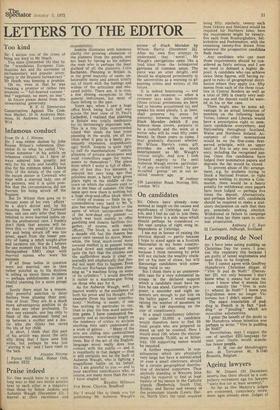Praise indeed
Sir: One would have to go a very long way to find two better articles next to each other in a magazine than those by Simon Jenkins and Auberon Waugh (December 23). I marvel at their excellence and responsibility.
Jenkins illustrates with luminous clarity the growing alienation of the planners from the people, and not least by having as his subject the man who is perhaps the least disliked of all the planners, Colin Buchanan. Planning in Britain is, in the great majority of cases, unbelievably nasty and almost totally out of touch with the feelings and wishes of the articulate and educated public. There are, it is true, a few shining exceptions to this general indictment, but most of them belong to the past. Years ago, when I saw a huge office block being built half way across the best view of St Paul's Cathedral, I realised that planning in Britain was totally inadequate for its increasingly important task. This is a tiny little overcrowded island that needs the best town planning in the world, yet all too often what it gets is a nasty, grotesquely expensive, stupendously ugly botch. Jenkins is quite right to call its manifestations "unholy alliances of private developers and local councillors eager for monuments to themselves ". The place from which I write is full of aamples of just this. For instance, it enjoyed not very long ago. that priceless asset, a fairly large green place right in the middle ofthe town on which the citizens used to lie in the heat of summer. On. that same spot now there is nothing but a huge shop-and-office block Which — irony of ironies — finds its ticcommodation very hard to let. It • also has another huge block — the name of which incorporatesthat of the now-dead city planner — which was built mainly to offer gambling and theatre facilities (together, of course, with many offices). The block is now maybe a decade old, but the theatre has never once opened its doors. Meanwhile, the local much-loved main covered market is at present being pulled down and redeveloped despite the fact that the citizens and the stallholders made it clear repeatedly and emphatically that they did not want this to happen. Even Professor Buchanan describes planning as "a machine firing on some of its cylinders ". I would describe it rather as a machine-gun firing on those who pay for it. As for Auberon Waugh, well, I marvel weekly at the excellence of both his prose and his thought. For example (from his latest contribution): "Nothing is easier, if one has nothing in particular to say, than to play the free word association game. I have commented frequently and at inordinate length on the tendency of critics to acclaim anything they can't understand as a work of genius . . ." Many of the arts are sliding into undisciplined incoherence, novel-writing among them. But if the art of the Englishlanguage novel really does lose contact with the public — and it is manifestly in that danger — then It will certainly not be the fault of Auberon Waugh, who is fighting a magnificent battle on its behalf. Sir, I am grateful to you — and to your excellent contributors who, of course, are many more than the two have singled out.
Royston Millmore Fox Brow, Clayton, Bradford Sir: I would like to thank you for publishing Mr Auberon Waugh's review of Black Marsden by Wilson Harris (December 23) After my own first attempt to understand that ' novel ', Mr Waugh's castigations came like a loud blast from the beleaguered garrisons of common sense. The piece was an utter delight, and should be displayed prominently in the universities as a warning to all aspiring critics and writers of the future.
It is indeed heartening — and too rare an occasion — when a reviewer lays aside his defences (those critical pretensions we have had to become accustomed to), and speaks his mind plainly. I, at least, shall preserve his piece for posterity; between the covers of Black Marsden (which if you believe those covers, purports to be a comedy and the work of a writer who will be read fifty years hence). In those years to come, I may gradually discover whether Mr Wilson Harris's comic gift provides me with as much entertainment as Mr Waugh's critical insight. And now I look forward eagerly to the next Auberon Waugh review, particularly of any so-called ' novel ' by any so-called ' genius ' set in our socalled ' modern ' age.
W. Joebear 138 Lancaster Road, Notting Hill, London W11

































 Previous page
Previous page